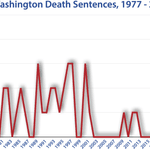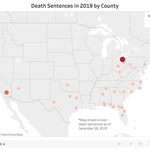
State & Federal
Washington

Notable Cases
In March 2004, both houses of the Washington state legislature passed resolutions stating that Chief Leschi was wrongly convicted and executed in Washington territory in 1858 and asked the state supreme court to vacate Leschi’s conviction. The court’s chief justice, however, said that this was unlikely to happen, since it was not at all clear that the state court had jurisdiction in a matter decided 146 years earlier in a territorial court. On December 10, 2004, Chief Leschi was exonerated by a unanimous vote by a Historical Court of Inquiry following a trial in absentia.
Notable Exonerations
On March 2, 1994, U.S. District Judge Robert Bryan overturned Benjamin Harris’ conviction and vacated his sentence of death for the 1984 murder of Jimmy Turner on the basis that his original trial lawyer had been incompetent. Harris’s attorney interviewed only 3 of the 32 witnesses listed in police reports and spent less than 2 hours consulting with Harris before trial. Harris’s co-defendant was acquitted. Bryan ordered Harris released from custody if not brought to a speedy retrial. The decision was upheld by the 9th Circuit Court of Appeals on September 12, 1995. The prosecution decided not to retry Harris but tried to have him confined as insane. (They had previously argued that he was competent to stand trial.) On July 16, 1997, a jury decided that Harris should not be imprisoned at Western State Hospital. Harris maintains his innocence and says he was framed.
Milestones in Abolition/Reinstatement
Washington abolished the death penalty in 1913, but reinstated it in 1919. The statute remained unchanged until 1975, when it was again abolished. An Initiative to the People in the same year, Initiative 316, reinstated it for a second time as the mandatory penalty for aggravated murder in the first degree. U.S. Supreme Court rulings in Woodson v. North Carolina and Roberts v. Louisiana invalidated laws that mandated death sentences and the statute was modified to give detailed procedures for imposing the death penalty.
This new law was itself found unconstitutional by the Washington Supreme Court, as a person who had pled not guilty could be sentenced to death, while someone who pled guilty would receive a maximum sentence of life imprisonment without possibility of parole. The current law was passed in 1981 to correct these constitutional defects.
On February 11, 2014, Governor Jay Inslee announced that he would issue a reprieve for any death penalty case that reaches his desk. He indicated that he did not intend to commute the sentences of the nine men on the state’s death row as part of this moratorium, but no executions are expected to occur while he is governor.
On October 11, 2018, in State v. Gregory, the Washington Supreme Court declared the state’s death penalty statute unconstitutional, saying that it was applied in an arbitrary and racially discriminatory manner. You can read the pleadings filed in the Washington Supreme Court here.
Other Interesting Facts
At the time its death penalty was declared unconstitutional in October 2018, Washington was the only state with an active gallows. Death-row prisoners in Washington were able to choose if their execution would be carried out by lethal injection or hanging. If the prisoner made no decision, the default method was lethal injection.
On September 10, 2010 Washington became the second state, after Ohio, to use a single dose injection of sodium thiopental as opposed to the typical three-drug protocol used in most other jurisdictions.

Resources

Washington Execution Totals Since 1976
News & Developments
News
Apr 10, 2025
A Retreat from the Harshest Punishments for Emerging Adult Defendants
To commemorate the 20th anniversary of the United States Supreme Court decision that ended the juvenile death penalty, DPI will release a report examining the legacy of this decision and its implications for emerging adults. This article examines one area of focus in the report: recent state courts decisions that have extended legal protections to emerging adults ages 18 to 20. In 2012, in Miller v. Alabama, the U.S. Supreme Court emphasized that“youth matters”…
Read MoreNews
Apr 24, 2023
Washington’s Unconstitutional Death-Penalty Law Stricken from the Books
On April 21, 2023, Governor Jay Inslee signed legislation removing the death penalty from the state’s laws. With that action, all three branches of the state’s government have taken steps to end capital punishment in Washington: Gov. Inslee had declared a moratorium on executions in 2014, the state Supreme Court found the statute unconstitutional in 2018, and the legislature has now stricken it from the…
Read MoreNews
Feb 12, 2020
Major Newspapers in Ohio, Washington Editorialize in Favor of Death Penalty Repeal
As state legislatures in Ohio and Washington contemplate the future of their death-penalty statutes, major newspapers in each of the states are advocating legislative…
Read MoreNews
Feb 03, 2020
Washington Senate Passes Bill to Formalize Repeal of Capital Punishment
For the third consecutive year, the Washington State Senate has voted to remove the death penalty from the state’s statute books. In a 28 – 18 vote praised by abolition advocates for its bipartisanship, four senate Republicans joined 24 of their Democratic colleagues on January 30, 2020 to formally repeal Washington’s capital punishment law. With a new Speaker replacing Democratic leadership who had prevented the bill from coming up for a vote in the House in 2018 and…
Read MoreNews
Dec 23, 2019
DPIC Analysis: Death Penalty Erosion Spreads Across the Western United States in 2019
In a year of declining death-penalty usage across the United States, nowhere was the erosion of capital punishment as sustained and pronounced in 2019 as it was in the western United States. Continuing a wave of momentum from Washington’s judicial abolition of capital punishment in October 2018, one state halted executions and dismantled its death chamber, another cleared its death row, two cut back on the circumstances in which the death penalty…
Read More


